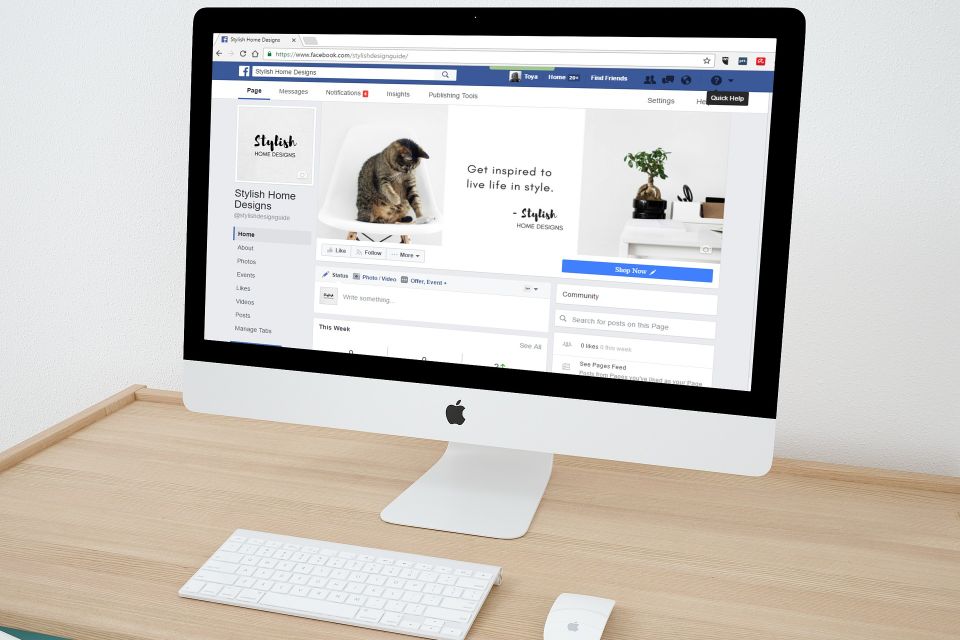Why a Facebook Page is Not a Substitute for a Website
When it comes to promoting and representing your small business online, having a strong, professional presence is crucial. While many businesses turn to social media platforms like Facebook to create that presence, relying solely on a Facebook page as your primary or only online representation can be a significant mistake. Here, we’ll explore the top ten reasons why using a Facebook page instead of a website is a bad idea, and discuss alternative strategies for enhancing your online business presence.1. You Don't Own ItOne of the most significant drawbacks of using a Facebook page as your business website is ownership. You don’t actually own the page; it belongs to Facebook. This means Facebook can change, remove, or make it hard to find in search results at any time. This lack of control can be frustrating and potentially damaging to your business, especially if you’ve invested a lot of time and effort into building your Facebook presence.2. You Exclude Non-Facebook UsersWhile Facebook boasts over two billion users, many people still don’t use the platform, especially among certain age groups. By depending solely on a Facebook page, you risk excluding potential customers who don’t use social media. It’s important to consider all possible channels to reach your audience.3. Limited SEO OptionsSearch engine optimization (SEO) is vital for improving your website’s ranking in search engine results. While you can optimize a Facebook page to some extent, the options are limited. A website allows for more extensive keyword targeting and content creation, increasing your chances of appearing multiple times in search results. This broader reach can help potential customers find your business more easily.4. Potential Costs for VisibilityFacebook operates on a "freemium" model, where creating a page and posting updates is free, but reaching a broader audience often requires paid ads. This can add to your marketing budget, and the costs can add up quickly. A professional website provides a more stable and potentially more cost-effective solution for long-term growth.5. Limited FunctionalityWhile a Facebook page allows you to post updates, upload photos, and chat with customers, its functionality is limited compared to a website. A website can include features like forms, e-commerce capabilities, custom pages, and a variety of formatting options that a Facebook page simply cannot match.6. No Sales FunnelA sales funnel is a series of steps that guide a potential customer towards making a purchase. Websites allow you to create calls-to-action, landing pages, and other tools to guide users through the sales process effectively. With a Facebook page, you lack the control and tools to create a similar experience.7. Limited Content OptionsWhile you can write an "About Us" section and post updates on a Facebook page, there’s little room for in-depth content that can attract users and improve SEO. A website allows you to create blog posts, articles, and other rich content that can engage and retain customers.8. Limited BrandingOn a Facebook page, your branding options are limited to a cover image and profile picture. In contrast, a website allows for a fully branded experience, including your choice of color schemes, fonts, and design elements to create a cohesive and professional look.9. Difficulty in Searching for ContentA website allows you to organize and search for content easily, making it user-friendly for both you and your customers. Facebook’s content organization is limited, making it harder to find and refer back to older posts.10. Insufficient AnalyticsThe analytics and data available on a Facebook page are not as comprehensive as those on a website. While Facebook provides some metrics on post reach and engagement, they are not as detailed or customizable as website analytics. This limitation makes it harder to track the effectiveness of your marketing efforts and make data-driven decisions.A Facebook Business Page Should Complement, Not Replace, a WebsiteTo grow your business online effectively, having a professional website in addition to a Facebook page is essential. A website allows you to promote your brand fully, showcase your products or services, create a sales funnel, and track your marketing efforts with detailed analytics. While using a Facebook page might seem easier and cheaper, its limitations make it an inadequate long-term solution.Partner with Us for Professional Web DesignAt SmallBizWhiz, we specialize in creating affordable, professional websites for businesses of all sizes. Our team of experienced designers and developers will work with you to create a website that perfectly reflects your brand and meets your business goals. Once your website is up and running, you can use your Facebook page to promote it and drive traffic to your site.
Don’t settle for a limited online presence. Invest in a professional website and take your business to the next level. Contact us today to learn more about how we can help your business succeed online.
Ready to revamp your online presence and maximize your business potential? Contact SmallBizWhiz now to get started on a professional website designed specifically for your business needs.


